Peichun Li
Filling the Missing: Exploring Generative AI for Enhanced Federated Learning over Heterogeneous Mobile Edge Devices
Oct 29, 2023



Abstract:Distributed Artificial Intelligence (AI) model training over mobile edge networks encounters significant challenges due to the data and resource heterogeneity of edge devices. The former hampers the convergence rate of the global model, while the latter diminishes the devices' resource utilization efficiency. In this paper, we propose a generative AI-empowered federated learning to address these challenges by leveraging the idea of FIlling the MIssing (FIMI) portion of local data. Specifically, FIMI can be considered as a resource-aware data augmentation method that effectively mitigates the data heterogeneity while ensuring efficient FL training. We first quantify the relationship between the training data amount and the learning performance. We then study the FIMI optimization problem with the objective of minimizing the device-side overall energy consumption subject to required learning performance constraints. The decomposition-based analysis and the cross-entropy searching method are leveraged to derive the solution, where each device is assigned suitable AI-synthesized data and resource utilization policy. Experiment results demonstrate that FIMI can save up to 50% of the device-side energy to achieve the target global test accuracy in comparison with the existing methods. Meanwhile, FIMI can significantly enhance the converged global accuracy under the non-independently-and-identically distribution (non-IID) data.
Federated Learning-Empowered AI-Generated Content in Wireless Networks
Jul 14, 2023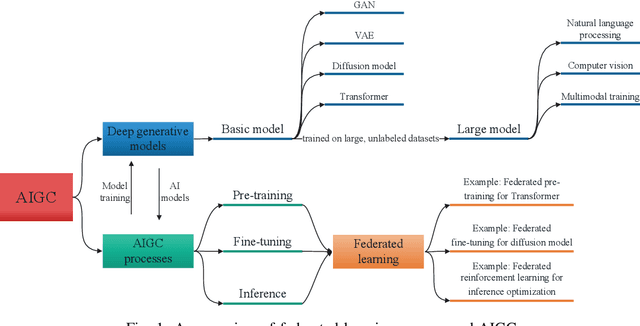
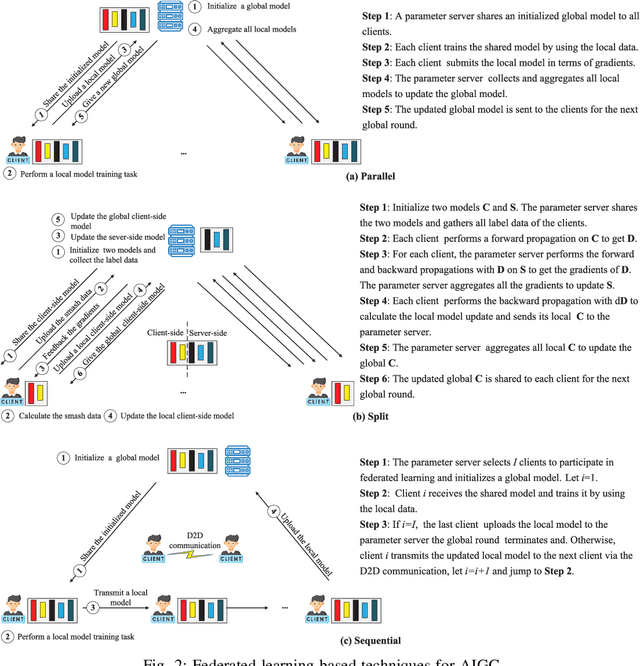
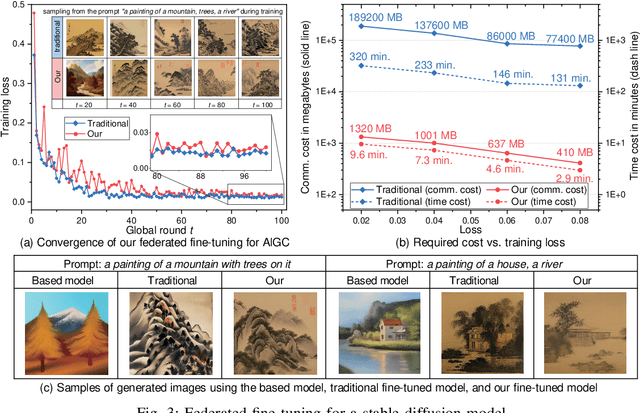
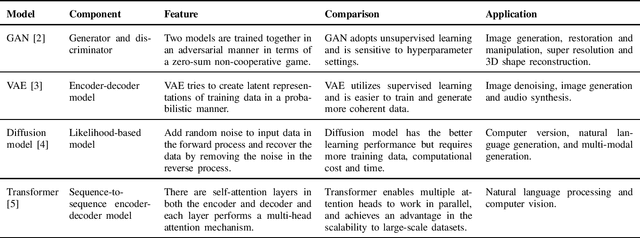
Abstract:Artificial intelligence generated content (AIGC) has emerged as a promising technology to improve the efficiency, quality, diversity and flexibility of the content creation process by adopting a variety of generative AI models. Deploying AIGC services in wireless networks has been expected to enhance the user experience. However, the existing AIGC service provision suffers from several limitations, e.g., the centralized training in the pre-training, fine-tuning and inference processes, especially their implementations in wireless networks with privacy preservation. Federated learning (FL), as a collaborative learning framework where the model training is distributed to cooperative data owners without the need for data sharing, can be leveraged to simultaneously improve learning efficiency and achieve privacy protection for AIGC. To this end, we present FL-based techniques for empowering AIGC, and aim to enable users to generate diverse, personalized, and high-quality content. Furthermore, we conduct a case study of FL-aided AIGC fine-tuning by using the state-of-the-art AIGC model, i.e., stable diffusion model. Numerical results show that our scheme achieves advantages in effectively reducing the communication cost and training latency and privacy protection. Finally, we highlight several major research directions and open issues for the convergence of FL and AIGC.
AnycostFL: Efficient On-Demand Federated Learning over Heterogeneous Edge Devices
Jan 08, 2023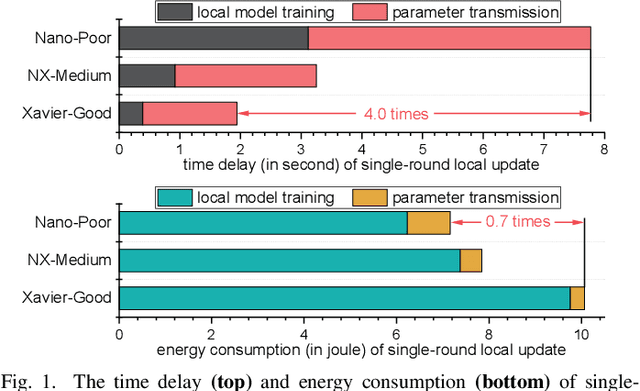
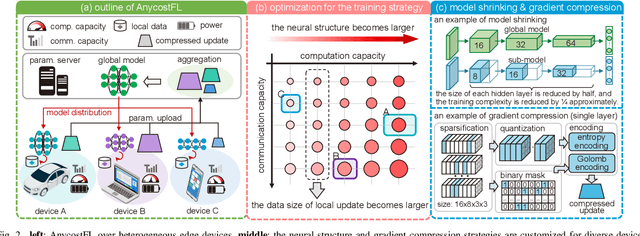
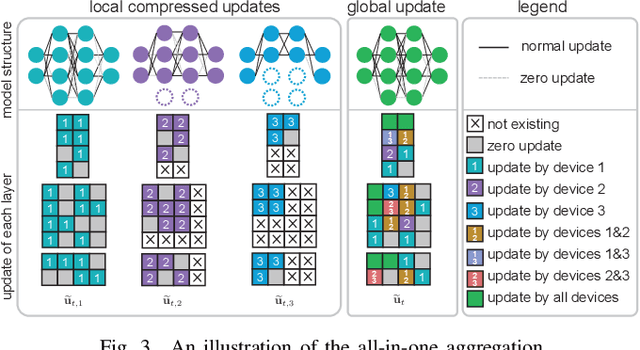

Abstract:In this work, we investigate the challenging problem of on-demand federated learning (FL) over heterogeneous edge devices with diverse resource constraints. We propose a cost-adjustable FL framework, named AnycostFL, that enables diverse edge devices to efficiently perform local updates under a wide range of efficiency constraints. To this end, we design the model shrinking to support local model training with elastic computation cost, and the gradient compression to allow parameter transmission with dynamic communication overhead. An enhanced parameter aggregation is conducted in an element-wise manner to improve the model performance. Focusing on AnycostFL, we further propose an optimization design to minimize the global training loss with personalized latency and energy constraints. By revealing the theoretical insights of the convergence analysis, personalized training strategies are deduced for different devices to match their locally available resources. Experiment results indicate that, when compared to the state-of-the-art efficient FL algorithms, our learning framework can reduce up to 1.9 times of the training latency and energy consumption for realizing a reasonable global testing accuracy. Moreover, the results also demonstrate that, our approach significantly improves the converged global accuracy.
FedGreen: Federated Learning with Fine-Grained Gradient Compression for Green Mobile Edge Computing
Nov 11, 2021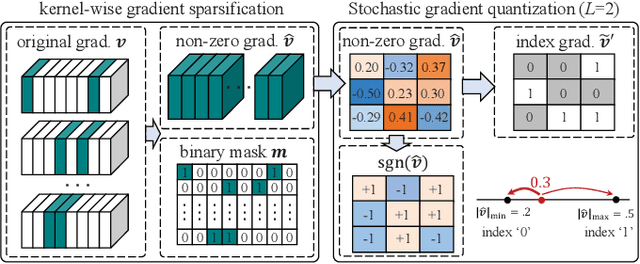
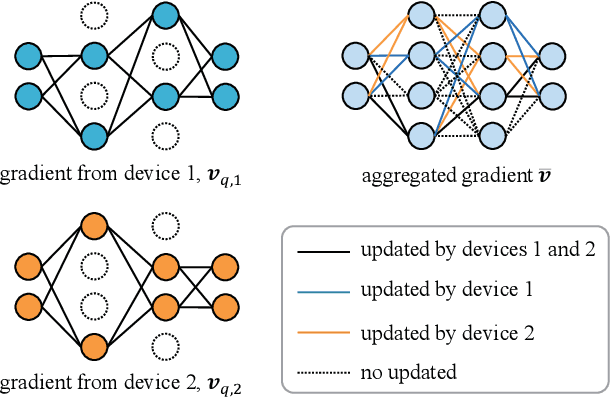
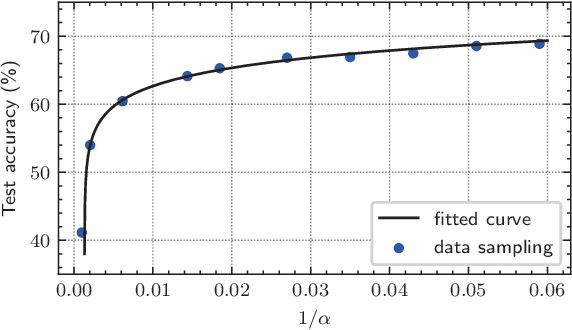

Abstract:Federated learning (FL) enables devices in mobile edge computing (MEC) to collaboratively train a shared model without uploading the local data. Gradient compression may be applied to FL to alleviate the communication overheads but current FL with gradient compression still faces great challenges. To deploy green MEC, we propose FedGreen, which enhances the original FL with fine-grained gradient compression to efficiently control the total energy consumption of the devices. Specifically, we introduce the relevant operations including device-side gradient reduction and server-side element-wise aggregation to facilitate the gradient compression in FL. According to a public dataset, we investigate the contributions of the compressed local gradients with respect to different compression ratios. After that, we formulate and tackle a learning accuracy-energy efficiency tradeoff problem where the optimal compression ratio and computing frequency are derived for each device. Experiments results demonstrate that given the 80% test accuracy requirement, compared with the baseline schemes, FedGreen reduces at least 32% of the total energy consumption of the devices.
FedParking: A Federated Learning based Parking Space Estimation with Parked Vehicle assisted Edge Computing
Oct 19, 2021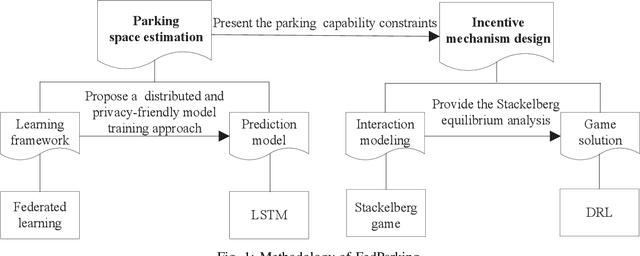
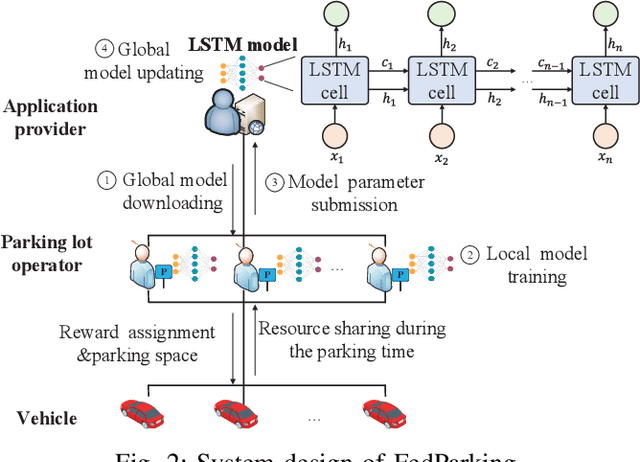
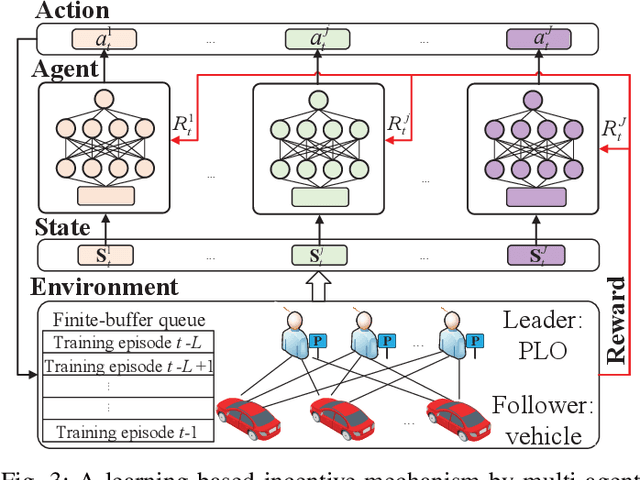

Abstract:As a distributed learning approach, federated learning trains a shared learning model over distributed datasets while preserving the training data privacy. We extend the application of federated learning to parking management and introduce FedParking in which Parking Lot Operators (PLOs) collaborate to train a long short-term memory model for parking space estimation without exchanging the raw data. Furthermore, we investigate the management of Parked Vehicle assisted Edge Computing (PVEC) by FedParking. In PVEC, different PLOs recruit PVs as edge computing nodes for offloading services through an incentive mechanism, which is designed according to the computation demand and parking capacity constraints derived from FedParking. We formulate the interactions among the PLOs and vehicles as a multi-lead multi-follower Stackelberg game. Considering the dynamic arrivals of the vehicles and time-varying parking capacity constraints, we present a multi-agent deep reinforcement learning approach to gradually reach the Stackelberg equilibrium in a distributed yet privacy-preserving manner. Finally, numerical results are provided to demonstrate the effectiveness and efficiency of our scheme.
 Add to Chrome
Add to Chrome Add to Firefox
Add to Firefox Add to Edge
Add to Edge